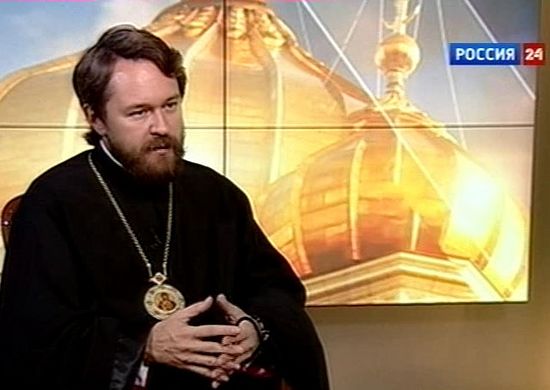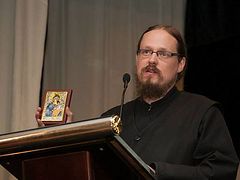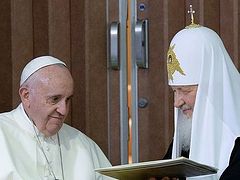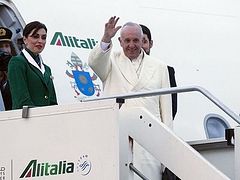On 13 February 2016, in an interview to Russia-24 TV Channel, Metropolitan Hilarion of Volokolamsk, chairman of the Moscow Patriarchate’s Department for External Church Relations, spoke about the significance of the meeting held by Patriarch Kirill of Moscow and All Russia and Pope Francis at Havana’s international airport.
—Good afternoon, Metropolitan Hilarion. The first question—what could you say about the outcome of the dialogue, the beginning of which we all saw? The Joint Declaration that was signed enables us to draw some conclusions. What can you say?
—The meeting lasted for two hours, all told, and resulted in the signing of the Joint Declaration. It seems to me that this declaration fully reflects what was discussed during the meeting.
The Pope and the Patriarch met at a time of turbulence. When we were preparing for the meeting, His Holiness Patriarch Kirill would often say that the current situation in the world reminds him of what happened in 1962, when the so-called “Cuban missile crisis” brought the world to the brink of nuclear war. Back then, the political goodwill on both sides helped resolve the crisis. However, today’s statements on Syria and their rhetoric, as well as new threats, have brought the world to the same brink.
At a time like this, it was a matter of considerable importance for the Pope and the Patriarch as leaders of two largest Christian Churches to hold a meeting with the view of discussing what is to be done now. For various coalitions are being created to combat terrorism, and there is a real danger that they may clash. There is an understanding that what is needed to defeat terrorism is one coalition consisting of all people of good will, not only politicians, but religious leaders alike. It was in this context of tension and urgency that the Pope and the Patriarch met in Havana.
—You were present at the talks yesterday, which lasted for two hours. Now we have seen the live broadcast of what discussions are taking placing at the Munich Security Conference. It is by coincidence, of course, that these two meetings were held approximately at the same time, in the same period of instability. It seems that the participants in the Munich meeting have not yet reached an agreement on what is to be done concerning, for instance, the situation of Christians in the Middle East or advances of terrorist groups in the Middle East and North Africa. Do you think that the declaration adopted at the meeting in Havana may somehow influence the current geopolitical situation? Will politicians, who do not seem to be willing to listen to each other, take it into consideration?
—All large-scale wars broke out because politicians would not care to listen to each other and could not hear each other. I believe that the voices of the two spiritual leaders, which sounded today as one voice, may after all make politicians hear and take into consideration the warning about the danger facing humanity.
The main topic discussed at the meeting was the situation in the Middle East. Both the Pope and the Patriarch devoted much attention to the situation of Christians who are being subjected not even to persecutions, but to genocide, in the Middle East and some countries of North and South Africa. It started with the so-called “Arab spring.” We all know who inspired the “Arab Spring,” and today we see its tragic consequences.
Thirteen years ago one and a half million Christians lived in Iraq; now there are one hundred fifty thousand Christians at best left there. Those who still live in the country are facing death all the time. A real tragedy occurred; a real genocide of Christians in Iraq was unleashed. Later, almost the same happened in Libya, with Christians being expelled from the country. An attempt to expel Christians was made in Egypt as well. However, under the new government this process, thank God, has stopped. Yet, we see what is still going on in Syria.
In fact, believers in Christ are being expelled from the lands where Christianity came into being, where Christians have lived for two thousand years side by side with representatives of other religious traditions, including Islam, while today the very existence of Christians there is at stake. Of course, during their meeting in Havana, the Pope and the Patriarch spoke, first and foremost, about that. They also agreed that it was necessary to call on the politicians taking part in various anti-terrorist coalitions to combine their efforts and take coordinated and concerted actions, for the lack of agreement can lead to tragedy that will bring innumerable sufferings and World War III.
—At the same time, it is being widely discussed now what role the Church is to play in settling the current situation that is turning into a global conflict and what practical follow-up the adoption of the declaration might have. Could you please tell how significant this event is for relations between the two Churches and what will follow in the dialogue between the Roman Catholic Church and the Russian Orthodox Church?
—I would like to note that there are no plans regarding the unification of the two Churches. The meeting was held with the view of calling upon people to better understanding. It is very important for Orthodox and Catholic Christians to hear each other so that at a time when the faithful of the Orthodox and the Catholic Churches are facing the same challenges we may learn to act not like competitors, but like allies. The Joint Declaration puts it clearly that we are not competitors but brothers. The faithful of the two Churches should be guided by this understanding.
It has nothing to do with unification or any theological or dogmatic compromise.
By the way, I should say that theological issues were not raised during the meeting at all. It is well known that Orthodox and Catholic Christians have differences over certain theological issues. For instance, the Orthodox believe that the Holy Spirit proceeds from God the Father, while Catholics say that the Holy Spirit proceeds from the Father and the Son. We also differ in our understanding of the structure of the Church on the universal level. Catholics regard the Pope as the universal bishop. We do not acknowledge the primacy of the Pope, be it in the form in which it exists nowadays or in which it existed in the first millennium.
These and other existing differences were not discussed at the meeting in Havana, for it was not aimed at addressing theological problems. Discussed were some topical issues, for it was necessary to speak in defense of the persecuted Christians and give assessment of the international situation. It is important that the Pope and the Patriarch spoke on the situation in Ukraine and in Europe, as well as on the religious revival in Russia and in some other Eastern European countries.
I would like to point out that the positions of the Pope and the Patriarch on Ukraine are in many ways similar. I can note that the primates have to a large extent similar views on the situation in Ukraine, as well as on the measures that should be taken to stop the fratricidal confrontation. Both the Pope and the Patriarch called on the faithful of the Orthodox and the Catholic Churches to exert every effort to restore peace in the Ukrainian land.
Of course, the declaration also focused on the unia, which remains a problem dividing our Churches. While preparing the meeting, we would often say that the problem of “uniatism” and of the Uniates’ actions in Western Ukraine is what divides our Churches. Regrettably, this problem has not been solved, and Greek Catholics go on saying very unpleasant and unjust things about the Russian Orthodox Church and continue to stir up inter-confessional strife.
However, the current urgent situation prompted the Pope and the Patriarch not to postpone the meeting. The right words were found to address the problem of unia. As the declaration puts it, “uniatism” is not a method to re-establish the unity of the faith.





Furthermore, what exactly is the good of this declaration? Did they agree to take some specific measures? Are they sending aid or people or missions to help? What exactly can they do and why is it so important for them to meet? Either one believes in the power of prayer, in which case, one must trace that back to the Truth, in which case, one must become realise that Orthodoxy is that Truth, in which case, one becomes aware that the pope is false, in which case, one must recognise that there is nothing of value to be had by declarations, by actions or even by prayer with the pope, or one is blind.